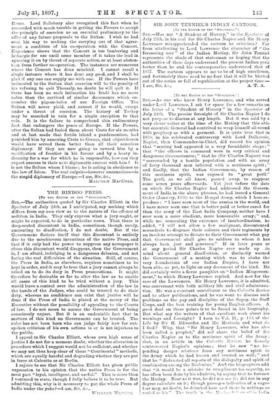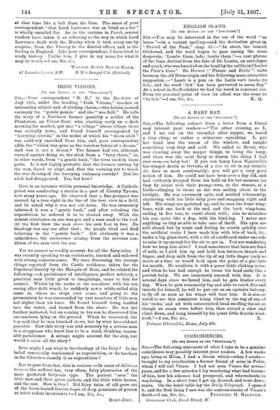SIR JOHN TENNIEL'S INDIAN CARTOON.
[TO TEE EDITOE Or THE " SPI.CTLTOR71 SIE,—Has not "A Student of History," in the Spectator of July 24th, in his zeal for Sir Charles Napier and Sir Henry Lawrence misapprehended the cartoon he criticises ? Far from attributing to Lord Lawrence the character of "the foreseeing seer" of the Indian Mutiny, Sir John Tenniel represents the shade of that statesman as hoping that tho authorities of these days understand the present Indian perit better than he and his contemporaries understood that of 1857. The cartoon appears to me to be of high excellence, and fortunately there need be no fear that it will be blotted out of the series or fail of republication at the proper time.—
I am, Sir, &c., A. T. A.
[To THE EDITOR OF THE " SPECTAT011.1 Sin,—As one who knew Henry Lawrence, and who served under Lord Lawrence, I ask for space for a few remarks on the letter of a "Student of History" in the Spectator of July 24th. The precise foresight of Sir Charles Napier I do not purpose to discuss at any length. But it was said by a very clever writer at the time of the Mutiny that this able but eccentric General had contrived to wrap himself all round with prophecy as with a garment. It is quite true that in 1850, in his celebrated controversy with Lord Dalhousie, Napier, then Commander-in-Chief, did record his opinion that "mutiny had appeared in a very formidable shape;" that "the officers in command were in very critical and dangerous circumstances;" that he (Sir Charles Napier) was "surrounded by a hostile population and with an army of forty thousand men infected with a mutinous spirit;" and finally, that the Indian Government, by reason of this mutinous spirit, was exposed to "great peril." The peril, as we all know, passed away, to reappear some seven years afterwards. Yet just before the date on which Sir Charles Napier had addressed the Govern- ment of India in the above phrases, he had issued a General Order (January, 1850) to the Bengal Army, which I here re. produce : "I have seen most of the armies in the world, and I have never seen one that is better paid or better cared for than the army of the East India Company, neither have I ever seen a more obedient, more honourable army;" and, while no concealing the existence of insubordination, he added, "I will not allow a few malignant, discontented scoundrels to disgrace their colours and their regiments by an insolent attempt to dictate to their Government what pay that Government shall give to soldiers to whom it has always been just and generous." If in later years or at any period Sir Charles Napier ever made up is mind about general disaffection, or distinctly warned the Government of a mutiny which was to shake the very foundations of our Indian Empire, I have not been able, as yet, to light on any document of the kind. He did certainly write a fierce pamphlet on "Indian Misgovern- ment," to which Henry Lawrence replied. And now for the case of the Lawrences. Sir Henry Lawrence, it is admitted, was conversant with both military life and civil administra- tion. He was a constant contributor to the Calcutta Review and to other publications, and he was wont to discuss such problems as the pay and discipline of the Sepoy, the Staff Corps, and the best training for young English officers. A good deal on these points is to be found in his biography. But what say the writers of that excellent work about his warnings and foresight ? I turn to Vol. II., p. 143, of the Life by Sir H. Edwardes and Mr. Merivale, and what do I find ? Why, that "Sir Henry Lawrence, who has also been called a prophet," did not share the belief of Sir Charles Napier as to the mutinous spirit of the Army ; that, in an article in the Calcutta Review, he fiercely controverted Napier's opinions ; that he saw "no im- pending danger whatever from any mutinous spirit in the Army which he had known and trusted so well;" and that he "distrusted all reports of the disloyalty and spirit of combination among the Brahmins." And the biographers add that "it would be a mistake to compliment his sagacity, as has often been done by his admirers, by saying that he foresaw the Mutiny. Near as it was, he did not see it ; did not in any degree calculate on it ; though passages indicative of a vague fear may, no doubt, he detected here and thene in writings so varied as his" The truth 's, th N .;:17 f. nn in Tqdia
at that time like a bolt from the blue. The sneer of your correspondent "that Lord Lawrence was as blind as a bat" is wholly uncalled for. As to the cartoon in Punch, several readers have taken it as referring to the way in which Lord Lawrence dealt with the Mutiny when it took every one by surprise, from the Viceroy to the district officer, and to the feeling in England. Like your correspondent, I have tried to study history. Unlike him, I give in my name for what it may be worth.—I am, Sir, &e., WALTER SCOTT SETON-KARR,
67 Lounules Square, S.W. R.M.'s Bengal C.S. (Retired).







































 Previous page
Previous page